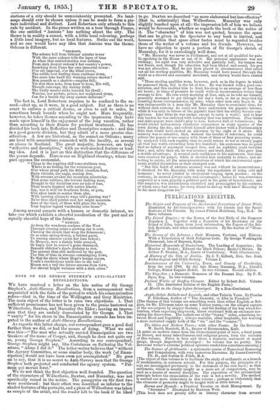NOTE ON SIR GEORGE • STEPHEN'S ANTI-SLAVERY RECOLLECTIONS.
WE have received a letter• on the late notice of Sir George Stephen's Anti-Slavery Recollections, from a correspondent well acquainted with the facts of the period to which his communication refers—that is, the time of the Wellington and Grey Ministries. The main object of the letter is to raise two objections. 1. That sufficient prominence has not been given to the praise bestowed on Wilberforce Buxton, and Macaulay the Elder; leaving an impres- sion that they are unduly depreciated by Sir George. 2. That " vanity " for his share in the Emancipation crusade has been im- puted to the author of Anti-Slavery Recollections.
As regards this latter charge, our correspondent goes a good deal farther than we did, or had the means of doing. What we said was this—" The men who actually carried Emancipation are two Quakers of the name of Cooper, and, though he does not quite say so, young George Stephen. According to our correspondent, George Stephen might say, like Coriolanus on fluttering the Vol- &Jiang, "Alone I did it." The letter-writer believes that "without the Agency Committee, or some similar body, the work [of Eman- cipation] would not have been even yet accomplished." He goes on to say, that it is no secret to Anti-Slavery men that Sir George Stephen both projected and conducted the agency system. " Pal- mam qui meruit ferat." We do not think the first objection well founded. The question of the characters of Wilberforce, Buxton, and Macaulay, was not specifically raised in the notice. The panegyrics on the first two were mentioned : but their effect was described as inferior to the shaded features of the portraits, and a piece of Wilberforce was taken as sample of the artist, and the reader left to the book if he liked
to go. Buxton we described "as more elaborated but less effective" (that is, artistically) than Wilberforce. Macaulay was only slightly touched upon at all : the impression left of him we believe -would be favourable, whether as regards the book or the notice of it. The " character " of him was not quoted, because the space that can be given in the Spectator to any book is limited, and because within that space other tastes must be regarded besides those of the writer of a volume and his friends. However, we have no objection to quote a portion of Sir George's sketch of Macaulay, for it is exceedingly well done.
"Mr. Macaulay was never in Parliament, and not at all qualified for pub- lic reeking in the House or out of it. His personal appearance was not striking ; his eight was very defective and partially lost; his tongue was not fluent, and, though his education had been liberal and sound, his pen was not attractive. Had he not been placed in circumstances that called out all his sterling qualities, Mr. Macaulay would have passed through the world as a shrewd and successful merchant, and slavery would have existed still.
"Those sterling qualities were, however, such as in the degree in which he possessed them, fall to the lot of few. He was blessed with a good con- stitution, and this enabled him to limit his sleep to an average of less than six hours ; in times of pressure he could without inconvenience reduce that average to five. He rose every morning at four, and, as he told me himself, generally managed to get through his day's work, so far as respected his counting-house correspondence, by nine, when other men only begin it. It was indispensable to a man like Mr. Macaulay thus to economize time, for without such economy he could not have undertaken his gigantic labours, while it was only in labour of the gigantic kind that his ability became con- spicuous. Like Atlas he was useless except to carry a world; and to pear this burden he was endowed with industry that was marvellous. Blue-books and state-papers were child's play to him, however dull or voluminous ; he would attend half-a-dozen charitable committees in every quarter of the town during the day, and refresh himself after dinner with a Parliamentary folio that would have choked an alderman by the sight of it alone. His memory was so retentive, that, without the trouble of reference, he could collate the papers of one session with them of three or four preceding years; he analyzed with such rapidity that he could reduce to ten or twenty pages all that was worth extracting from five hundred ; his acuteness was so great that no fallacy of argument escaped him, and no sophistry could bewilder him ; and, more than all, he was accuracy and truth itself. This gave him a double advantage; it secured such confidence in his statements that they were received for gospel, while it enabled him instantly to detect, and de- tecting to refute, all the misrepresentations of which his controversial oppo- nents availed themselves as their strongest arm.
"But this habit of extreme accuracy was not without its inconvenience ; it obtained for Mr. Macaulay with many the reputation of being cold and insincere : he never yielded to excitement verging upon passion ; on the contrary, he seemed always calm and circumspect ; hence he was sometimes suspected as a man playing a political part in the guise of benevolence ; and this suspicion was industriously cherished and promulgated by his enemies, of whom none had more ; for every friend to slavery well knew Macaulay to be his most dangerous foe."






































 Previous page
Previous page